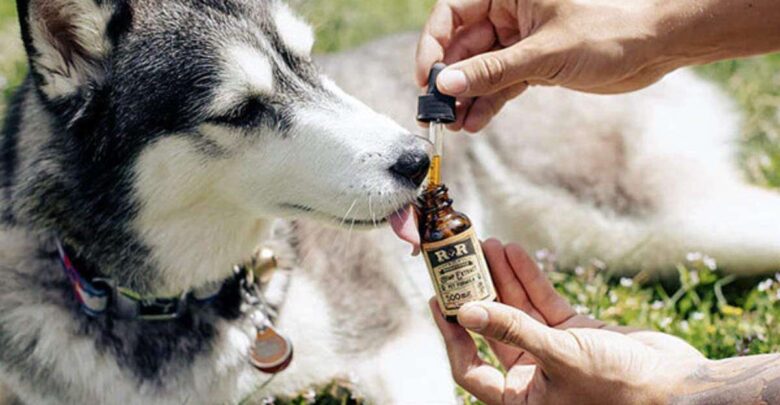Does CBD Oil for Dogs Work?

There are several stories on the internet about the success of cannabidiol (CBD) in treating different health issues in dogs. These issues include anxiety, seizures, cancer, etc. With such a level of effectiveness, one tends to wonder if one compound can do so much.
Therefore, in this article, we will answer the question “does CBD for dogs work?” as we carefully examine this compound. With the reveal in this read, you will be able to decide if it is worth giving your canine buddy cannabidiol oil.
A Quick 411 on CBD
CBD is one of the over 100 cannabinoid compounds that are contained within cannabis plants. These cannabinoids have the ability to mimic the naturally occurring endocannabinoid found in every vertebrate and some invertebrates. Among these cannabinoids, cannabidiol and tetrahydrocannabinol (THC) are the most well-known.
The endocannabinoid receptors are located throughout the bodies of vertebrates. The function of the endocannabinoid system (ECS) is that of a master regulator. It sends signals to other systems in the body to either slow down or speed up activity to ensure that the body is stabilized and homeostasis is achieved.
Since these cannabinoids such as THC and CBD can mimic the natural endocannabinoid, they are able to affect the receptors within the ECS. Hence, they can equally affect the overall working conditions of the body.
The effect of each cannabinoid is different to an extent. For example, if tetrahydrocannabinol is ingested, it can cause a psychoactive feeling making the consumer feel high. On the other hand, cannabidiol does not have or produce this effect when ingested.
Is CBD Harmful to Dogs?
From the little research that has been conducted on cannabidiol, the worst effect cannabidiol has on dogs is diarrhea and some alterations in a particular liver enzyme value. This is usually the case when a high dosage has been administered.
This effect is in contrast to THC which has been known to lead to dog toxicity and mortality when they are given to canines at human dosages. Click here to learn more about THC for dogs.
Although CBD does not cause any sort of harm, there is a major concern surrounding the use of this compound on dogs. This concern surrounds the fact that cannabidiol hinders the effects of a body chemical known as cytochrome P450. The cytochrome P450 works to metabolize most drugs that are consumed.
Hence, the efficacy of a drug in the body is dependent on how well it is metabolized. Therefore, if cannabidiol can inhibit the chemical that performs the metabolizing, then drugs taken could be rendered less or non-effective.
Also, if the safety of a drug within the body is determined by how quickly it can be removed from the animal’s body, then if it is not removed within that period due to the effect of CBD, it could increase toxicity.
As a result of this, before giving your dog cannabidiol in any form, it is wise that you consult your veterinarian. They will be able to advise you if it is safe to administer CBD to your dog especially if it is on medications.
Does CBD Work for Dogs?
Humans were the first to begin using cannabidiol and even at that, the research of the effects on the human body is still relatively new. An estimated 23,000 research papers have been published on the effects of the compound on humans and laboratory animals. This is the available research on this topic.
On the other hand, research on the effects on canines is still few. Nevertheless, we will look at the efficacy of this product on certain health issues using the available research at hand.
Arthritis
A good number of studies have proven that CBD is effective in treating dog arthritis. A study from the Cornell University College of Veterinary Medicine revealed that administering 4.4mg per pound to dogs twice a day for one month showed noteworthy pain relief improvement.
Some of the dogs who were treated were very decrepit and were even about to be euthanatized as their owners couldn’t bear to see them suffer anymore. Visit https://pets.webmd.com/what-happens-put-pet-to-sleep#1 to read more about dog euthanasia. However, these same dogs were able to move around freely and even climb stairs after one month of treatment.
Interestingly, a study from Baylor University had the same results. They concluded that when administered via liposomal formulation, cannabidiol worked better.
Behavior
Dogs are known to be quite anxious especially around loud noises. Hence, it is no secret that many owners give their furry friends CBD to curb their anxiety. While several anecdotal pieces of evidences are supporting its effectiveness in treating anxiety, there has been no positive result from any controlled study.
A University of Western Australia study may provide future promise regarding aggressive behavior. It was discovered that after administrating cannabidiol to shelter dogs for 15 days, formerly aggressive shelter dogs were less aggressive towards humans.
Cancer
Many reports have come in that cannabidiol induces the death of cancer cells and stops metastasis. This led to a study conducted by Cornell University whereby it was discovered that CBD used in conjunction with a regular drug used in chemotherapy brought about the reduction of cancer-cell spread in vitro far better than when the drug alone was used.
From veterinarians’ anecdotal reports, a widespread claim exists that cannabidiol has led to cancer cell remission or shrinkage in dogs.
Conclusion
Apart from the above, a study on dog seizures has produced moderate results, while a study on CBD’s effect on itchiness is equally positive. Hence, with the above, one can conclude that cannabidiol works on dogs for a wide range of health-related issues.





